外研版(2019)必修 第一册Unit 2 Exploring English Using language课件(共69张PPT)
文档属性
| 名称 | 外研版(2019)必修 第一册Unit 2 Exploring English Using language课件(共69张PPT) | 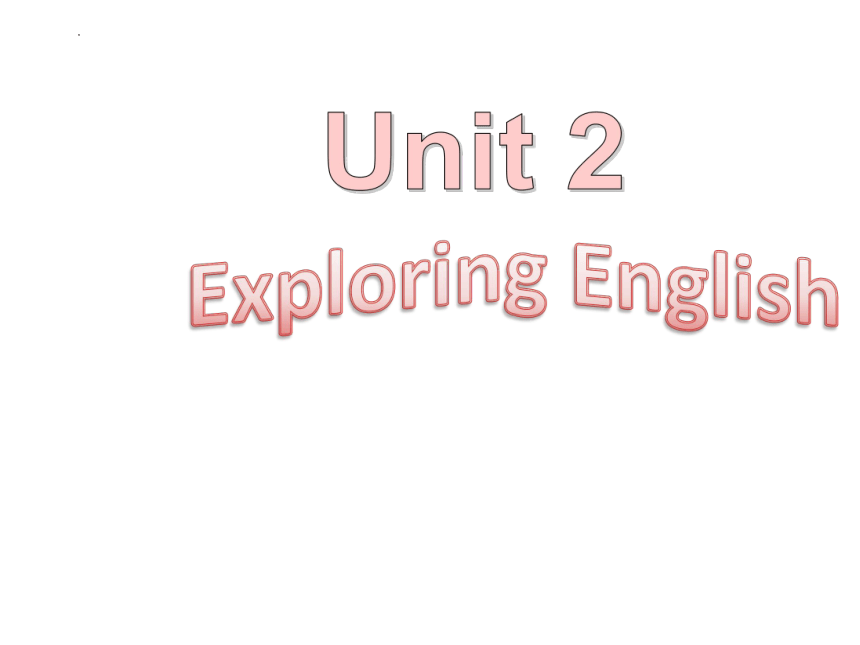 | |
| 格式 | pptx | ||
| 文件大小 | 4.2MB | ||
| 资源类型 | 教案 | ||
| 版本资源 | 外研版(2019) | ||
| 科目 | 英语 | ||
| 更新时间 | 2023-10-23 22:09:18 | ||
图片预览



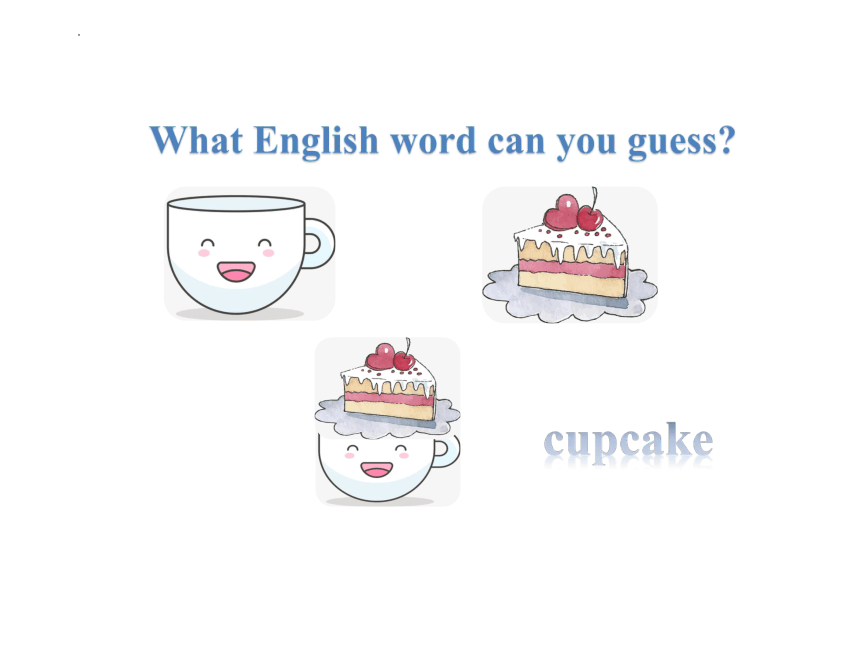

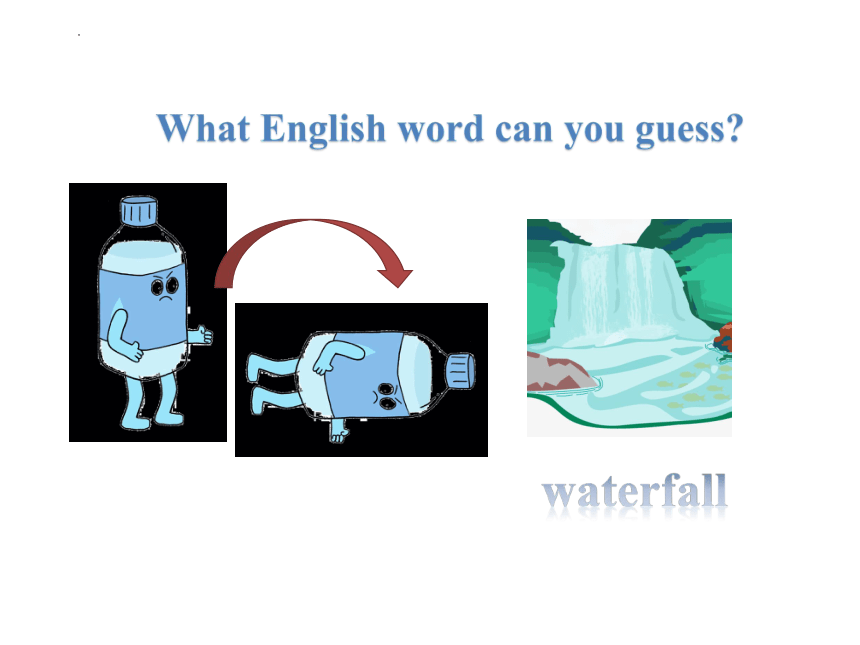
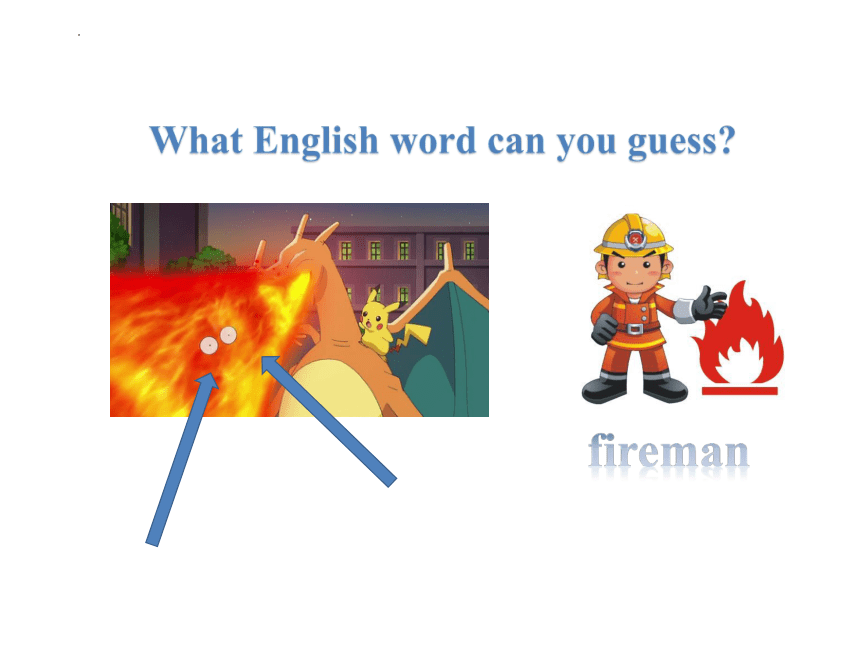
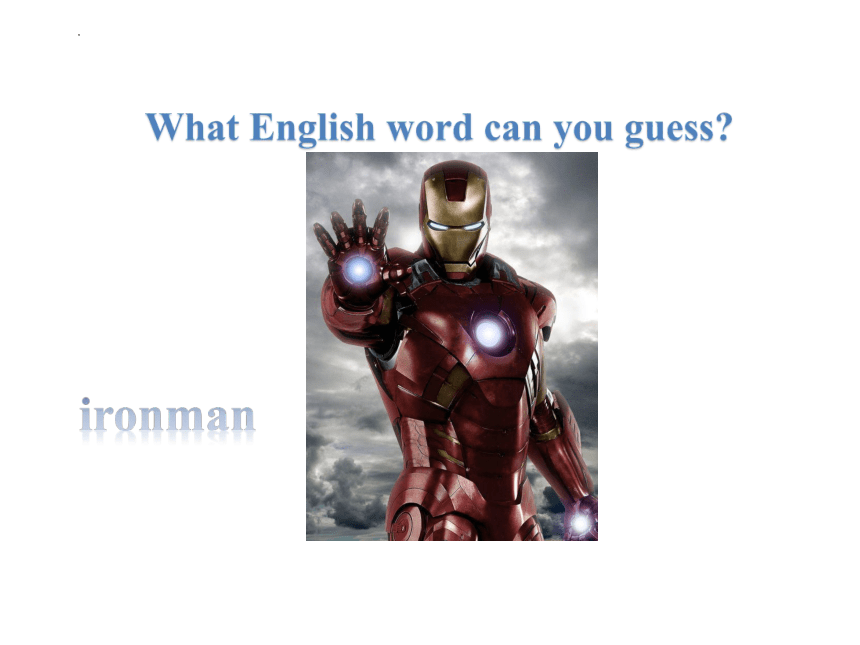
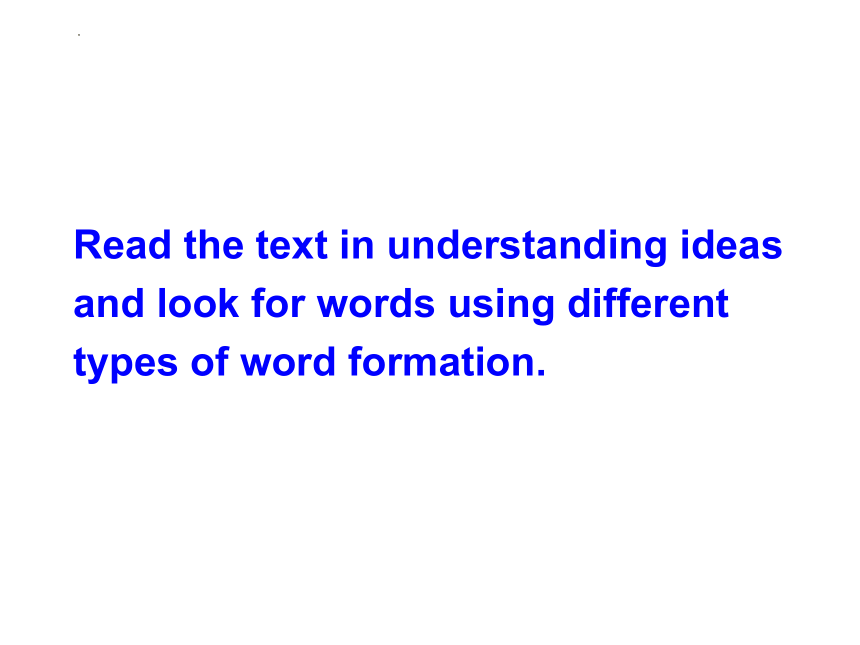
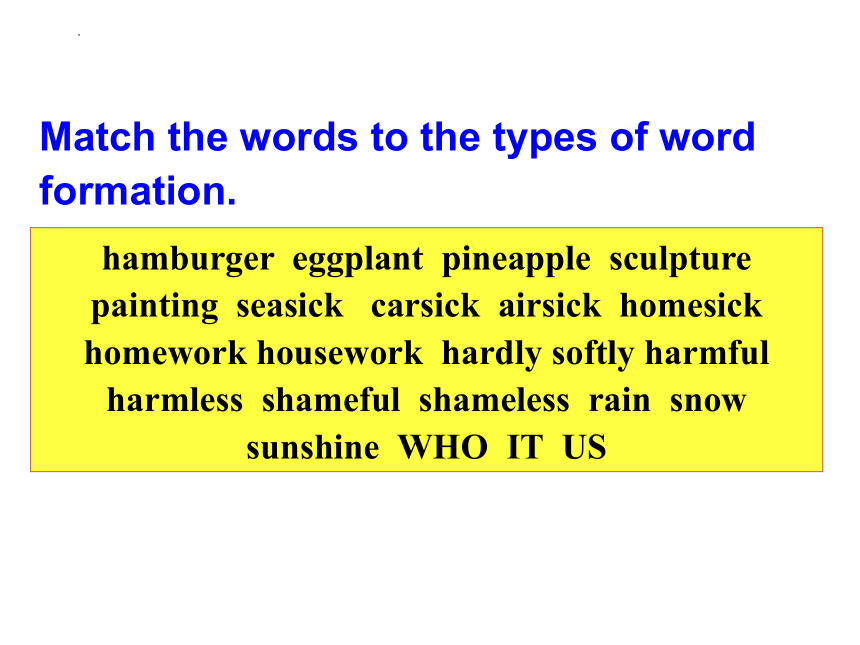
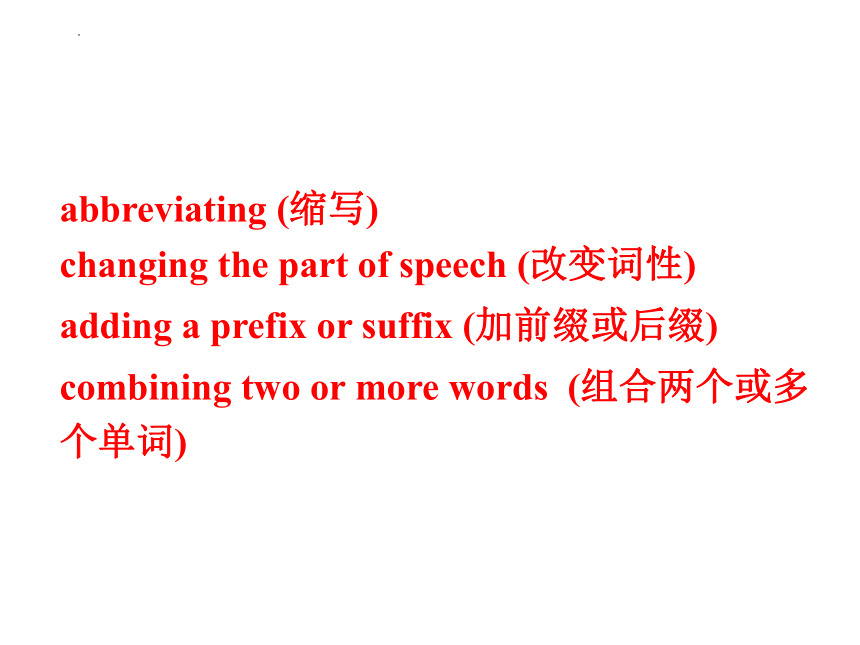
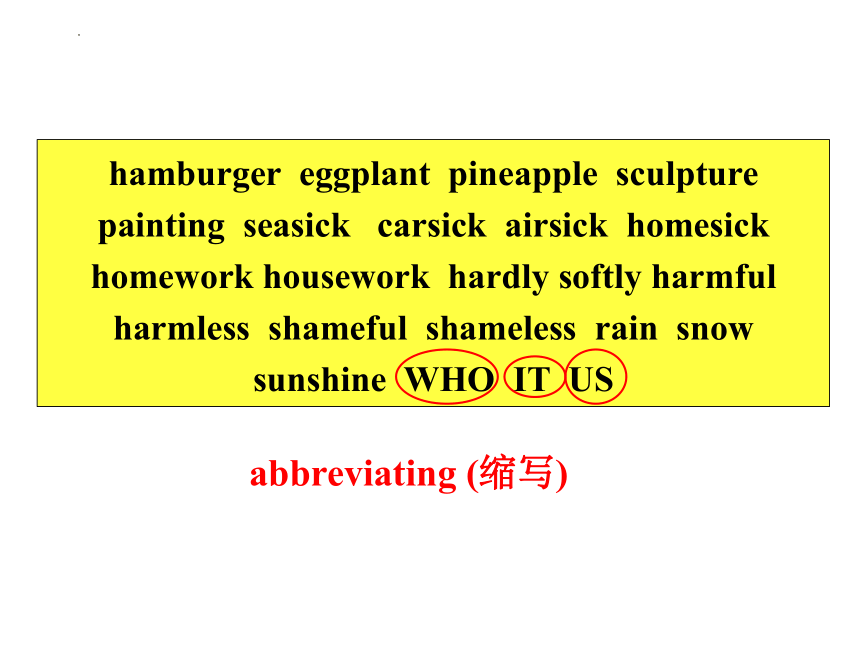
文档简介
(共69张PPT)
Exploring English
Unit 2
Using Language
Learn to know the word formation rules in English.
Learn to know the differences between American English and British English in spelling and words choice.
What English word can you guess
cupcake
What English word can you guess
strawberry
What English word can you guess
waterfall
What English word can you guess
fireman
What English word can you guess
ironman
Read the text in understanding ideas and look for words using different types of word formation.
Match the words to the types of word formation.
hamburger eggplant pineapple sculpture painting seasick carsick airsick homesick homework housework hardly softly harmful harmless shameful shameless rain snow sunshine WHO IT US
abbreviating (缩写)
changing the part of speech (改变词性)
adding a prefix or suffix (加前缀或后缀)
combining two or more words (组合两个或多个单词)
abbreviating (缩写)
hamburger eggplant pineapple sculpture painting seasick carsick airsick homesick homework housework hardly softly harmful harmless shameful shameless rain snow sunshine WHO IT US
changing the part of speech (改变词性)
hamburger eggplant pineapple sculpture painting seasick carsick airsick homesick homework housework hardly softly harmful harmless shameful shameless rain snow sunshine WHO IT US
adding a prefix or suffix (加前缀或后缀)
hamburger eggplant pineapple sculpture painting seasick carsick airsick homesick homework housework hardly softly harmful harmless shameful shameless rain snow sunshine WHO IT US
combining (组合) two or more words
hamburger eggplant pineapple sculpture painting seasick carsick airsick homesick homework housework hardly softly harmful harmless shameful shameless rain snow sunshine WHO IT US
Look at the sentences and expressions from the reading passage. Match the words in bold to the types of word formation.
a. Neither is there pine nor apple in pineapple.
b. …sculpt a sculpture…
c. When we… see rain…, we can say “it’s
raining”…
d. WHO
Word formation
□ 1 abbreviating
□ 2 changing the part of speech
□ 3 adding a prefix or suffix
□ 4 combining two or more words
1-d 2-c 3-b 4-a
Now look for more examples of each type in the reading passage.
1. abbreviating: IT, US
2. changjing the part of speech: when we …
see… snow, we can say… “it’s snowing”.
3. adding a prefix or suffix: paint-painting,
hard-hardly, soft-softly, harm-harmless/
harmful, shame-shameless/ shameful,
visible-invisible
4. combining two or more words: hamburger,
eggplant, seasick, airsick, carsick,
homesick, homework, housework
Word formation
1. Abbreviation 缩略法
2. Conversion 转化法
3. Derivation 派生法
4. Compounding 合成法
Focus on
基本用法
一种语言的词汇绝不能看作是无生命的、完全的整体。词汇是会通过其构词能力不断地生成和再生成的。
构词法
(根据一定的规律构成新单词的方法)
Compounding(合成)
Conversion(转化)
Derivation(派生)
Acronym(缩略)
Compounding(合成)
create a new word by compounding two or more existing words
(由两个或更多的词合成一个词)
+
=
+
=
(1) n.+n.: air conditioner (空调);blood pressure(血压)
(2) adj. + n.:central bank (中央银行);fast food(快餐)
(3) v-ing. + n.:washing machine(洗衣机);driving license(驾驶证)
(4) n. + v-ing. :story-telling(讲故事);hand-writing(笔迹)
(5) adv. + v.:outbreak(爆发);output(产量)
(6) v. + adv.:breakdown(故障);feedback(反馈)
1.合成名词
2.合成形容词
(1)词尾为过去分词或+ed: absent-minded(心不在焉的);hand-made(手工的)
(2)词尾为现在分词:good-looking(好看的);easy-going(随和的)
(3)词尾为形容词:duty-free(免税的);homesick (想家的)
3.合成动词
overcome(战胜);undergo(经历)
4.合成副词
whole-heartedly (全心全意地);
downstairs(在楼下)
Find the Compounding words in the reading material and give the meanings.
While we’re doing all this travelling, we can get seasick at sea, airsick in the air and carsick in a car, but we don’t get homesick when we get back home. And speaking of home, why aren’t homework and housework the same thing
seasick(晕船); airsick(晕机); carsick(晕车); homesick(想家); homework(家庭作业); housework(家务事)
【即学即练】
change the part of speech(词性)(改变单词的词性)
Conversion(转化)
(1)动词 名词
Look at me.
Let me have a look.
(2)名词 动词
Open your book.
I must book the ticket.
(3)形容词 动词
Our classroom is very clean.
We clean our classroom every day.
(4)形容词 名词
(意义改变)
You are right.
Citizens have the right to speak freely.
请大家判断词性转化类型,然后翻译句子
(1) Let me have a try.
(2) You could shoulder the task.
(3) You should try your best to better your performance.
(4)They are discussing the content of the story.
v.-n.
让我来试一试。
n.-v.
你可以承担这项任务。
adj.-v.
你应该尽最大努力让自己有更好的表现。
adj.-n.
他们正在讨论这个故事的内容。
【即学即练】
Derivation 派生
by adding a prefix or (and) a suffix (在词根上加上前、后缀构成另外一个词)
unemployment
单词=
前缀
词根
后缀
改变词义
词的本意
改变词性
Prefix-前缀
by-
inter-
mid-
under-
1.表示否定的前缀:
dis-
il-
im-
ir-
in-
un-
2.表示空间位置,方向的前缀:
Prefix-前缀
ex-
fore
mid-
post-
3.表示比较程度差别关系的前缀:
extra-
over-
super-
under
…
4.表示时间的前缀:
5.表示重复的前缀:
re-
6.表示动化的前缀:
en-
1.表示否定意义前缀:
Prefix-前缀
dis-
in-
il-
im-
ir-
mis-
non-
un-
convenient→ inconvenient (不方便的)
legal→ illegal (不合法的)
possible→ impossible (不可能的)
responsible→ irresponsible (不负责的)
ability→ disability (无能力; 残疾)
understand → misunderstand(误解)
profit → non-profit(非营利的)
certain →uncertain(不确定的)
Prefix-前缀
by- “附近,邻近”road → byroad(侧道)
under-“在......下面” ground → underground(地铁)
inter- “在……间,相互”national → international(国际的)
mid- “中间” night → midnight(午夜), autumn → mid-
autumn(中秋)
re- “又,再” arrange→ rearrange (重新安排)
en- “使......” able→ enable (使能够)
pre- “前” war → pre-war(战前的)
post-“后” war → post-war(战后的)
2.表示空间位置,
方向关系的前缀
4.表示其他意义
3.表示时间
advantage
sensitive
moral
logical
reversible(可逆的)
necessary
disadvantage 不利的
insensitive 不敏感的
immoral 不道德的
illogical 无逻辑的
irreversible 不可逆的
unnecessary 没有必要的
给以下单词加上前缀并猜测词义
【即学即练】
Suffix-后缀
-er: design → designer(设计者)
-or: act → actor(演员)
-ee: employ → employee(雇员)
-ist: art→ artist (艺术家)
-ian: music→ musician(音乐家)
-ant: assist→ assistant (助手)
-ess: god→ goddess (女神)
-ness: careless → carelessness(粗心)
-ment: achieve→ achievement (成就)
-dom: free→ freedom(自由)
-tion: attract→ attraction (吸引力)
-ance: accept→ acceptance (接受)
-ence: depend→ dependence (依赖)
-ture: mix→ mixture (混合,混合物)
-y: recover→ recovery (恢复, 痊愈)
2.其他名词后缀
Suffix-后缀
-able: avoid →avoidable(可避免的)
-tive: attract→ attractive (有吸引力的)
-al: nation→ national (民族的)
-(i)ous: danger→ dangerous (危险的)
-ful: help→ helpful (有帮助的)
-less: care→ careless (粗心的)
-some: trouble→ troublesome (有麻烦的)
-ial: influence→ influential (有影响力的)
4. 动词后缀
-en: sharp →sharpen(使尖锐)
-fy: simple → simplify (使简化)
-ize: modern→ modernize (使现代化)
5. 副词后缀
-ly: happy →happily(高兴地)
-s: indoor→ indoors (在室内)
-ward(s): toward(趋向)
找出段落中的派生词并猜测词义
The gesture “thumb-up” is commonly misinterpreted. In English, it is popularly known as ‘thumbs up’, despite the fact that the action is commonly performed with only one hand. English-speaking Caucasians use it to signal ‘OK’, which is the same meaning as O.K. ring gesture. The two can in fact be used almost interchangeably.
commonly 通常地; misinterpret 误解;
popularly 流行地;action 动作;interchangeably 可交换地
【即学即练】
Acronym(缩略)
A word formed from the first letters of the words that make up the name of sth.
(缩略法,即将单词缩写,词义和词性保持不变)
World Health Organization→ WHO
Information Technology→ IT
telephone→phone
aeroplane→plane
2.截头缩略
1.首字母缩略
examination→exam
laboratory→lab
3.去尾缩略
Match the words in bold to the types of word formation.
1. changing the part of speech(词性)
2. adding a prefix (前缀)or suffix(后缀)
3. abbreviating(缩略)
4. combining two or more words
a. Neither is there pine nor
apple in pineapple.
b. ... sculpt a sculpture
c. When we…see rain…
we can say “it raining”…
d. WHO
【即学即练】
rain(形容词) ________ agree(反义)__________
nation(形容词)_______ farm(人)__________
recent(副词)________ friend(形容词)________
hope(形容词)_______ job(形容词)_________
visit(名词)__________ access(形容词) ________
eight(八十)________ true(名词)___________
kind(名词)_______ China(形容词)________
1. 按括号内的要求改写下列单词
rainy
national
recently
hopeful
visitor
eighty
kindness
disagree
farmer
friendly
jobless
accessible
truth
Chinese
Practice (II) 用括号中所给单词的正确形式填空:
Harry Potter is a boy who is full of ________________ (imagine)
___________________ (congratulate)! You have done so well in the game.
I received a letter of ________________ (invite) but I didn’t accept it.
His late ____________(arrive) made a mess of our plan.
To the _________________(amaze) of the parents, their child can look after himself
without their help.
He did exercise to _________________ (strong) his muscles.
I went out to ________________( breath) the fresh air.
Don’t take his words ______________ (serious); he was just kidding.
The boy felt ____________ (comfort) with his new classmates, so he seldom spoke.
10. The _______________(popular) of foreign words is part of the Japanese interest in
anything new.
11. The boy’s ___________ (usual) behavior puzzled the doctor.
12. He _____________ (like) those who are not well-behaved.
13. He was ________________ (formal) dressed in a blue silk shirt open to the neck.
imagination
Congratulations
invitation
arrival
amazement
strengthen
breathe
seriously
uncomfortable
popularity
unusual
dislikes
informally
03
Applying the rules
Complete the passage with the help of word formation.
When you open a dictionary, you often come across a lot of unfamiliar words. You might think this is a bit scary. But many of them are formed using other simpler words. This is called word formation.
Words formed by combining other words are called compounds, for example, __________ (a friend that you contact by writing, traditionally using a pen) and ____________ (known by many people).
penfriend
well-known
Prefixes and suffixes often have fixed meanings. If you add un- or in- to a word, the new word usually means opposite. For example, if something isn’t correct it’s _________, and if someone isn’t happy they’re _________. Words with the suffixes –ment and –ness are often nouns. For example, if somebody has improved a lot, they have made great ______________.
incorrect
unhappy
improvement
Some nouns and adjectives can be used as verbs, or the other way round. When we calm somebody down, they become ________. And we can give someone a present by ____________ it.
calm
presenting
And sometimes a word is made up of the first letters of several words: “World Trade Organization” can be referred to as ________, and ________ is short for “as soon as possible”.
It is impossible to know the meaning of every word, but knowing about word formation can help us guess their meanings.
WTO
ASAP
Choose one type and come up with as many words as possible.
□ abbreviating
□ changing the part of speech
□ adding a prefix or suffix
□ combining two or more words
Group A:
unlike, dislike, likely, likelihood
Group B:
unlike, dislike, likeness, likely, liking, unlikely
like
VS
给下列单词加上前缀dis-, un-, in-, im-或mis-, 构成意思相反的词。
1. agree ________________
2. complete ________________
3. healthy ________________
4. important ________________
5. able ________________
6. cover ________________
disagree
incomplete
unhealthy
unimportant
unable / disable
discover / uncover
7. known ________________
8. understand ________________
9. fair ________________
10. possible ________________
unknown
misunderstand
unfair
impossible
用括号内单词的正确形式填空。
1. Having enough fat and salt in your meals will reduce the urge to snack (吃点心) between meals and will improve the taste of your food. However, be ________ (care) not to go to extremes.
careful
2. She is determined to carry on with her ______________ (educate).
3. Chengdu has dozens of new millionaires, Asia’s biggest building, and fancy new hotels. But for tourists like me, pandas are its top ___________ (attract).
education
attraction
American and British English
Learn to know the American English words and their English equivalents.
Watch Video for fun!
Look at the pictures and get to know the American English words and their English equivalents.
a subway (American English)/underground
(British English)
b highway(American English)/ motorway
(British English)
c theater (American English)/ theatre( British
English)
Keys:
d gas (American English)/ petrol British
English)
e apartment(American English)/flat (British
English)
f elevator (American English)/lift(British
English)
Now complete the passage with the
words above.
Today, American English is in common international use. It is different from British English in several ways, mostly in spelling and vocabulary. Some American spellings were created by Noah Webster, who made one of America’s first dictionaries. He changed “-re” spelling to “-er”, which is why ________ is spelt ________ in American English.
theatre
theater
The Americans and the British also use different words for everyday things. For example, Americans talk about putting ______ in their cars and driving along the ________, whereas in the UK, people put ________ in their cars and drive along the ___________. Americans take the ________ to the top floor of a building, but the British use the _____.
gas
highway
petrol
motorway
elevator
lift
In the US, they take the ________ , but in the UK, people travel on the ____________. Americans live in a(n) ___________, while the British live in a(n) ______.
It’s not as confusing as it seems: usually people from the two countries can understand each other from the context. But that doesn’t stop them having a friendly argument about which word is the “right” one!
subway
underground
apartment
flat
Decide whether the following words are American English spelling or British spelling.
color metre centre fiber humor organize apologise analyse traveling license
color
fiber
humor
organize
traveling
license
metre
centre
apologise
analyse
Both of them think they’re on the first floor, but they are on different floors.
I’m an American.
I’m an English.
Look at the picture and figure out their problem.
Noah Webster
Born: October 16, 1758
Place: Hartford, Connecticut
Died: May 28, 1848
Place: New Haven, Connecticut
Do you know this man
Noah Webster was the author of the first American Dictionary.
He wanted to simplify the spelling of English and make it look different from British English.
Let’s go to the films!
OK. But how shall we go to the movies
Why not go by underground
Er, but the subway station is far away.
Read for fun.
Hi, I’d like some sweets, please.
No problem. All the candy we sell is sweet.
I see, so you sell sweet sweets.
Shall we move the new bed by lorry
Not by me, I hope.
Oh, I’m sorry, Lori. I meant by truck.
Why there are differences between British and American English
Work in pairs. Find more examples of differences between American and British English. Use a dictionary or search on the Internet.
Exploring English
Unit 2
Using Language
Learn to know the word formation rules in English.
Learn to know the differences between American English and British English in spelling and words choice.
What English word can you guess
cupcake
What English word can you guess
strawberry
What English word can you guess
waterfall
What English word can you guess
fireman
What English word can you guess
ironman
Read the text in understanding ideas and look for words using different types of word formation.
Match the words to the types of word formation.
hamburger eggplant pineapple sculpture painting seasick carsick airsick homesick homework housework hardly softly harmful harmless shameful shameless rain snow sunshine WHO IT US
abbreviating (缩写)
changing the part of speech (改变词性)
adding a prefix or suffix (加前缀或后缀)
combining two or more words (组合两个或多个单词)
abbreviating (缩写)
hamburger eggplant pineapple sculpture painting seasick carsick airsick homesick homework housework hardly softly harmful harmless shameful shameless rain snow sunshine WHO IT US
changing the part of speech (改变词性)
hamburger eggplant pineapple sculpture painting seasick carsick airsick homesick homework housework hardly softly harmful harmless shameful shameless rain snow sunshine WHO IT US
adding a prefix or suffix (加前缀或后缀)
hamburger eggplant pineapple sculpture painting seasick carsick airsick homesick homework housework hardly softly harmful harmless shameful shameless rain snow sunshine WHO IT US
combining (组合) two or more words
hamburger eggplant pineapple sculpture painting seasick carsick airsick homesick homework housework hardly softly harmful harmless shameful shameless rain snow sunshine WHO IT US
Look at the sentences and expressions from the reading passage. Match the words in bold to the types of word formation.
a. Neither is there pine nor apple in pineapple.
b. …sculpt a sculpture…
c. When we… see rain…, we can say “it’s
raining”…
d. WHO
Word formation
□ 1 abbreviating
□ 2 changing the part of speech
□ 3 adding a prefix or suffix
□ 4 combining two or more words
1-d 2-c 3-b 4-a
Now look for more examples of each type in the reading passage.
1. abbreviating: IT, US
2. changjing the part of speech: when we …
see… snow, we can say… “it’s snowing”.
3. adding a prefix or suffix: paint-painting,
hard-hardly, soft-softly, harm-harmless/
harmful, shame-shameless/ shameful,
visible-invisible
4. combining two or more words: hamburger,
eggplant, seasick, airsick, carsick,
homesick, homework, housework
Word formation
1. Abbreviation 缩略法
2. Conversion 转化法
3. Derivation 派生法
4. Compounding 合成法
Focus on
基本用法
一种语言的词汇绝不能看作是无生命的、完全的整体。词汇是会通过其构词能力不断地生成和再生成的。
构词法
(根据一定的规律构成新单词的方法)
Compounding(合成)
Conversion(转化)
Derivation(派生)
Acronym(缩略)
Compounding(合成)
create a new word by compounding two or more existing words
(由两个或更多的词合成一个词)
+
=
+
=
(1) n.+n.: air conditioner (空调);blood pressure(血压)
(2) adj. + n.:central bank (中央银行);fast food(快餐)
(3) v-ing. + n.:washing machine(洗衣机);driving license(驾驶证)
(4) n. + v-ing. :story-telling(讲故事);hand-writing(笔迹)
(5) adv. + v.:outbreak(爆发);output(产量)
(6) v. + adv.:breakdown(故障);feedback(反馈)
1.合成名词
2.合成形容词
(1)词尾为过去分词或+ed: absent-minded(心不在焉的);hand-made(手工的)
(2)词尾为现在分词:good-looking(好看的);easy-going(随和的)
(3)词尾为形容词:duty-free(免税的);homesick (想家的)
3.合成动词
overcome(战胜);undergo(经历)
4.合成副词
whole-heartedly (全心全意地);
downstairs(在楼下)
Find the Compounding words in the reading material and give the meanings.
While we’re doing all this travelling, we can get seasick at sea, airsick in the air and carsick in a car, but we don’t get homesick when we get back home. And speaking of home, why aren’t homework and housework the same thing
seasick(晕船); airsick(晕机); carsick(晕车); homesick(想家); homework(家庭作业); housework(家务事)
【即学即练】
change the part of speech(词性)(改变单词的词性)
Conversion(转化)
(1)动词 名词
Look at me.
Let me have a look.
(2)名词 动词
Open your book.
I must book the ticket.
(3)形容词 动词
Our classroom is very clean.
We clean our classroom every day.
(4)形容词 名词
(意义改变)
You are right.
Citizens have the right to speak freely.
请大家判断词性转化类型,然后翻译句子
(1) Let me have a try.
(2) You could shoulder the task.
(3) You should try your best to better your performance.
(4)They are discussing the content of the story.
v.-n.
让我来试一试。
n.-v.
你可以承担这项任务。
adj.-v.
你应该尽最大努力让自己有更好的表现。
adj.-n.
他们正在讨论这个故事的内容。
【即学即练】
Derivation 派生
by adding a prefix or (and) a suffix (在词根上加上前、后缀构成另外一个词)
unemployment
单词=
前缀
词根
后缀
改变词义
词的本意
改变词性
Prefix-前缀
by-
inter-
mid-
under-
1.表示否定的前缀:
dis-
il-
im-
ir-
in-
un-
2.表示空间位置,方向的前缀:
Prefix-前缀
ex-
fore
mid-
post-
3.表示比较程度差别关系的前缀:
extra-
over-
super-
under
…
4.表示时间的前缀:
5.表示重复的前缀:
re-
6.表示动化的前缀:
en-
1.表示否定意义前缀:
Prefix-前缀
dis-
in-
il-
im-
ir-
mis-
non-
un-
convenient→ inconvenient (不方便的)
legal→ illegal (不合法的)
possible→ impossible (不可能的)
responsible→ irresponsible (不负责的)
ability→ disability (无能力; 残疾)
understand → misunderstand(误解)
profit → non-profit(非营利的)
certain →uncertain(不确定的)
Prefix-前缀
by- “附近,邻近”road → byroad(侧道)
under-“在......下面” ground → underground(地铁)
inter- “在……间,相互”national → international(国际的)
mid- “中间” night → midnight(午夜), autumn → mid-
autumn(中秋)
re- “又,再” arrange→ rearrange (重新安排)
en- “使......” able→ enable (使能够)
pre- “前” war → pre-war(战前的)
post-“后” war → post-war(战后的)
2.表示空间位置,
方向关系的前缀
4.表示其他意义
3.表示时间
advantage
sensitive
moral
logical
reversible(可逆的)
necessary
disadvantage 不利的
insensitive 不敏感的
immoral 不道德的
illogical 无逻辑的
irreversible 不可逆的
unnecessary 没有必要的
给以下单词加上前缀并猜测词义
【即学即练】
Suffix-后缀
-er: design → designer(设计者)
-or: act → actor(演员)
-ee: employ → employee(雇员)
-ist: art→ artist (艺术家)
-ian: music→ musician(音乐家)
-ant: assist→ assistant (助手)
-ess: god→ goddess (女神)
-ness: careless → carelessness(粗心)
-ment: achieve→ achievement (成就)
-dom: free→ freedom(自由)
-tion: attract→ attraction (吸引力)
-ance: accept→ acceptance (接受)
-ence: depend→ dependence (依赖)
-ture: mix→ mixture (混合,混合物)
-y: recover→ recovery (恢复, 痊愈)
2.其他名词后缀
Suffix-后缀
-able: avoid →avoidable(可避免的)
-tive: attract→ attractive (有吸引力的)
-al: nation→ national (民族的)
-(i)ous: danger→ dangerous (危险的)
-ful: help→ helpful (有帮助的)
-less: care→ careless (粗心的)
-some: trouble→ troublesome (有麻烦的)
-ial: influence→ influential (有影响力的)
4. 动词后缀
-en: sharp →sharpen(使尖锐)
-fy: simple → simplify (使简化)
-ize: modern→ modernize (使现代化)
5. 副词后缀
-ly: happy →happily(高兴地)
-s: indoor→ indoors (在室内)
-ward(s): toward(趋向)
找出段落中的派生词并猜测词义
The gesture “thumb-up” is commonly misinterpreted. In English, it is popularly known as ‘thumbs up’, despite the fact that the action is commonly performed with only one hand. English-speaking Caucasians use it to signal ‘OK’, which is the same meaning as O.K. ring gesture. The two can in fact be used almost interchangeably.
commonly 通常地; misinterpret 误解;
popularly 流行地;action 动作;interchangeably 可交换地
【即学即练】
Acronym(缩略)
A word formed from the first letters of the words that make up the name of sth.
(缩略法,即将单词缩写,词义和词性保持不变)
World Health Organization→ WHO
Information Technology→ IT
telephone→phone
aeroplane→plane
2.截头缩略
1.首字母缩略
examination→exam
laboratory→lab
3.去尾缩略
Match the words in bold to the types of word formation.
1. changing the part of speech(词性)
2. adding a prefix (前缀)or suffix(后缀)
3. abbreviating(缩略)
4. combining two or more words
a. Neither is there pine nor
apple in pineapple.
b. ... sculpt a sculpture
c. When we…see rain…
we can say “it raining”…
d. WHO
【即学即练】
rain(形容词) ________ agree(反义)__________
nation(形容词)_______ farm(人)__________
recent(副词)________ friend(形容词)________
hope(形容词)_______ job(形容词)_________
visit(名词)__________ access(形容词) ________
eight(八十)________ true(名词)___________
kind(名词)_______ China(形容词)________
1. 按括号内的要求改写下列单词
rainy
national
recently
hopeful
visitor
eighty
kindness
disagree
farmer
friendly
jobless
accessible
truth
Chinese
Practice (II) 用括号中所给单词的正确形式填空:
Harry Potter is a boy who is full of ________________ (imagine)
___________________ (congratulate)! You have done so well in the game.
I received a letter of ________________ (invite) but I didn’t accept it.
His late ____________(arrive) made a mess of our plan.
To the _________________(amaze) of the parents, their child can look after himself
without their help.
He did exercise to _________________ (strong) his muscles.
I went out to ________________( breath) the fresh air.
Don’t take his words ______________ (serious); he was just kidding.
The boy felt ____________ (comfort) with his new classmates, so he seldom spoke.
10. The _______________(popular) of foreign words is part of the Japanese interest in
anything new.
11. The boy’s ___________ (usual) behavior puzzled the doctor.
12. He _____________ (like) those who are not well-behaved.
13. He was ________________ (formal) dressed in a blue silk shirt open to the neck.
imagination
Congratulations
invitation
arrival
amazement
strengthen
breathe
seriously
uncomfortable
popularity
unusual
dislikes
informally
03
Applying the rules
Complete the passage with the help of word formation.
When you open a dictionary, you often come across a lot of unfamiliar words. You might think this is a bit scary. But many of them are formed using other simpler words. This is called word formation.
Words formed by combining other words are called compounds, for example, __________ (a friend that you contact by writing, traditionally using a pen) and ____________ (known by many people).
penfriend
well-known
Prefixes and suffixes often have fixed meanings. If you add un- or in- to a word, the new word usually means opposite. For example, if something isn’t correct it’s _________, and if someone isn’t happy they’re _________. Words with the suffixes –ment and –ness are often nouns. For example, if somebody has improved a lot, they have made great ______________.
incorrect
unhappy
improvement
Some nouns and adjectives can be used as verbs, or the other way round. When we calm somebody down, they become ________. And we can give someone a present by ____________ it.
calm
presenting
And sometimes a word is made up of the first letters of several words: “World Trade Organization” can be referred to as ________, and ________ is short for “as soon as possible”.
It is impossible to know the meaning of every word, but knowing about word formation can help us guess their meanings.
WTO
ASAP
Choose one type and come up with as many words as possible.
□ abbreviating
□ changing the part of speech
□ adding a prefix or suffix
□ combining two or more words
Group A:
unlike, dislike, likely, likelihood
Group B:
unlike, dislike, likeness, likely, liking, unlikely
like
VS
给下列单词加上前缀dis-, un-, in-, im-或mis-, 构成意思相反的词。
1. agree ________________
2. complete ________________
3. healthy ________________
4. important ________________
5. able ________________
6. cover ________________
disagree
incomplete
unhealthy
unimportant
unable / disable
discover / uncover
7. known ________________
8. understand ________________
9. fair ________________
10. possible ________________
unknown
misunderstand
unfair
impossible
用括号内单词的正确形式填空。
1. Having enough fat and salt in your meals will reduce the urge to snack (吃点心) between meals and will improve the taste of your food. However, be ________ (care) not to go to extremes.
careful
2. She is determined to carry on with her ______________ (educate).
3. Chengdu has dozens of new millionaires, Asia’s biggest building, and fancy new hotels. But for tourists like me, pandas are its top ___________ (attract).
education
attraction
American and British English
Learn to know the American English words and their English equivalents.
Watch Video for fun!
Look at the pictures and get to know the American English words and their English equivalents.
a subway (American English)/underground
(British English)
b highway(American English)/ motorway
(British English)
c theater (American English)/ theatre( British
English)
Keys:
d gas (American English)/ petrol British
English)
e apartment(American English)/flat (British
English)
f elevator (American English)/lift(British
English)
Now complete the passage with the
words above.
Today, American English is in common international use. It is different from British English in several ways, mostly in spelling and vocabulary. Some American spellings were created by Noah Webster, who made one of America’s first dictionaries. He changed “-re” spelling to “-er”, which is why ________ is spelt ________ in American English.
theatre
theater
The Americans and the British also use different words for everyday things. For example, Americans talk about putting ______ in their cars and driving along the ________, whereas in the UK, people put ________ in their cars and drive along the ___________. Americans take the ________ to the top floor of a building, but the British use the _____.
gas
highway
petrol
motorway
elevator
lift
In the US, they take the ________ , but in the UK, people travel on the ____________. Americans live in a(n) ___________, while the British live in a(n) ______.
It’s not as confusing as it seems: usually people from the two countries can understand each other from the context. But that doesn’t stop them having a friendly argument about which word is the “right” one!
subway
underground
apartment
flat
Decide whether the following words are American English spelling or British spelling.
color metre centre fiber humor organize apologise analyse traveling license
color
fiber
humor
organize
traveling
license
metre
centre
apologise
analyse
Both of them think they’re on the first floor, but they are on different floors.
I’m an American.
I’m an English.
Look at the picture and figure out their problem.
Noah Webster
Born: October 16, 1758
Place: Hartford, Connecticut
Died: May 28, 1848
Place: New Haven, Connecticut
Do you know this man
Noah Webster was the author of the first American Dictionary.
He wanted to simplify the spelling of English and make it look different from British English.
Let’s go to the films!
OK. But how shall we go to the movies
Why not go by underground
Er, but the subway station is far away.
Read for fun.
Hi, I’d like some sweets, please.
No problem. All the candy we sell is sweet.
I see, so you sell sweet sweets.
Shall we move the new bed by lorry
Not by me, I hope.
Oh, I’m sorry, Lori. I meant by truck.
Why there are differences between British and American English
Work in pairs. Find more examples of differences between American and British English. Use a dictionary or search on the Internet.
